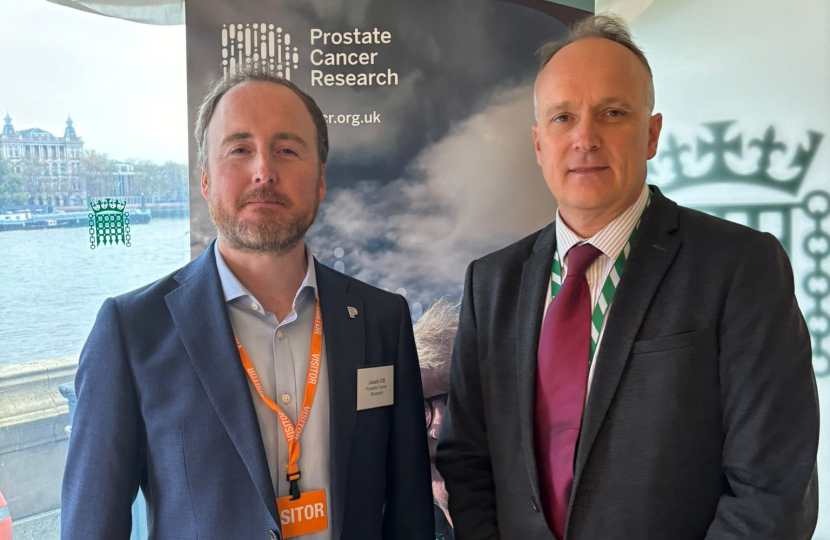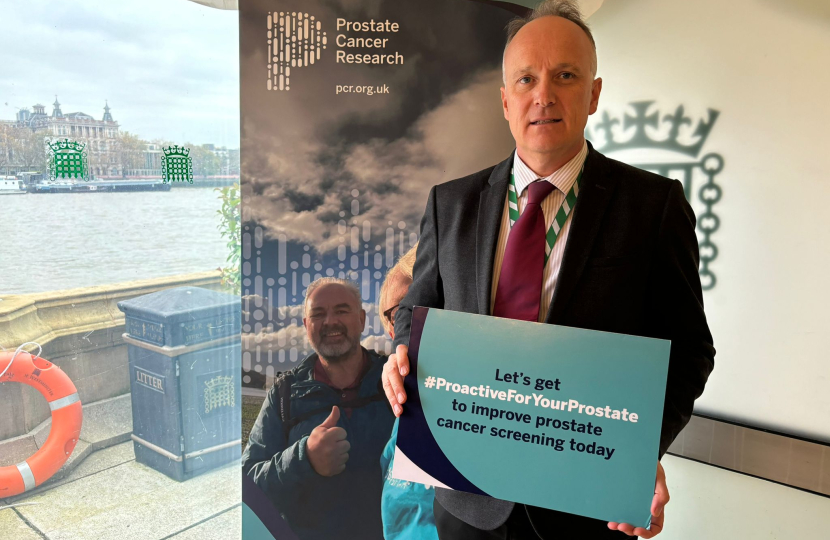Dr Neil Hudson MP joined celebrities, clinicians and volunteers at a Prostate Cancer Research event aimed at boosting screening across the UK - and in particular for at-risk groups.
Keen to show his support for this vital cause, Dr Hudson is working alongside the cancer charity to see their shared vision of a more preventative healthcare model become a reality. Dr Hudson is passionate that this will both improve patient outcomes and protect our precious NHS's resources with lower costs.
The event coincided with the launch of Prostate Cancer Research's Socio-economic Impact of Prostate Cancer Screening report which shines a light on high-risk demographics and how government can better insulate society from the tragic impact of prostate cancer. Following the report, PCR have made three core recommendations:
- Introduce targeted prostate cancer screening for high-risk groups as soon as possible
PCR seek to optimise screening using a PSA test, focusing on high-risk groups – Black men, those with a family history, and those with a BRCA1 or BRCA2 mutations. This risk-stratified approach, prioritising those at highest risk of prostate cancer, has been shown to provide economic benefits, while requiring the lowest level of health system change.
- Trial new diagnostic tests in clinical practice
Alongside more targeted PSA testing, society needs to focus on getting new diagnostic technologies into pilots (e.g. reflex tests), to gather real-world evidence and understand efficacy in diverse populations. Once clinical utility has been demonstrated, we should expand the screening programme to cover the general population utilising a test with greater accuracy, as this will realise the greatest economic benefits.
- Adopt AI-driven tech to enhance patient outcomes and efficiencies
To further enhance patient outcomes and the economic benefits of earlier detection, Government needs to integrate AI technology into the NHS. We need to leverage its potential to improve the accuracy and reliability of screening, avoiding the need for unnecessary biopsies, while also boosting operational efficiencies. By adopting AI-driven technologies in imaging, we can streamline processes, reduce diagnostic errors and ensure resources are allocated more effectively.
The report demonstrates that screening could save lives, alleviate the burden on our healthcare system by avoiding late-stage diagnoses and the associated treatments while delivering a positive economic benefit to the UK.
Dr Neil Hudson MP said:
"It was incredibly heartening to see so many politicians, clinicians, researchers, volunteers and public figures united against prostate cancer.”
"A huge thank you to Prostate Cancer Research for bringing together such a wealth of talent to help raise awareness, steer policy and better fund much-needed solutions.
" I would urge the Government to fully heed PCR's policy suggestions with regard to early-intervention screening to save lives and reduce costs."
CEO of Prostate Cancer Research, Oliver Kemp, said:
"There is much work ahead, but through thoughtful planning, patient-centred approaches, and a commitment to innovation, we can set a new standard for prostate cancer screening – one that brings real hope to all those affected."
You can read the full report here: PCR_Socioeconomic_Impact_Prostate_Cancer_Screening_Nov24-v1.0.pdf






